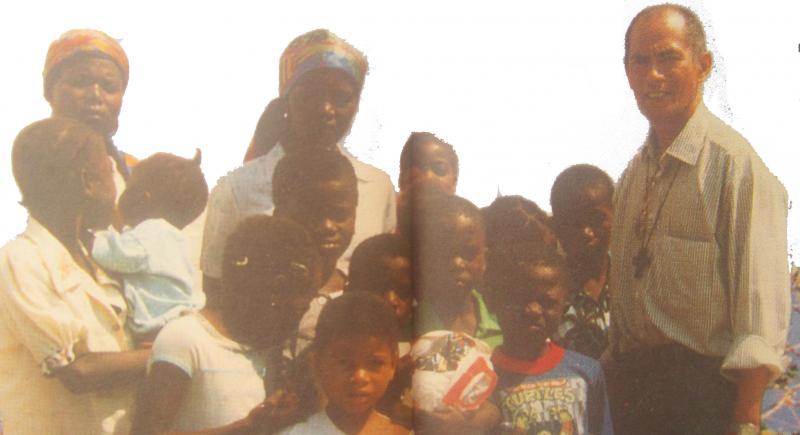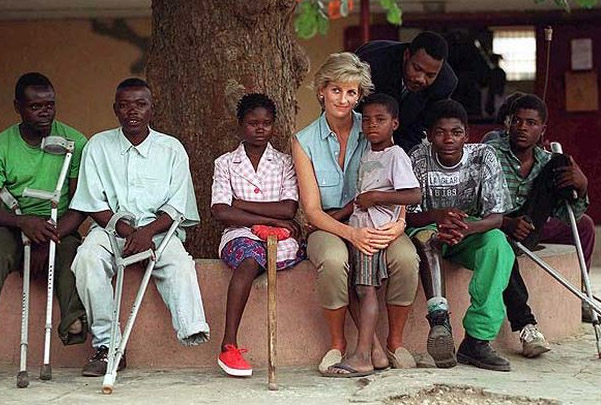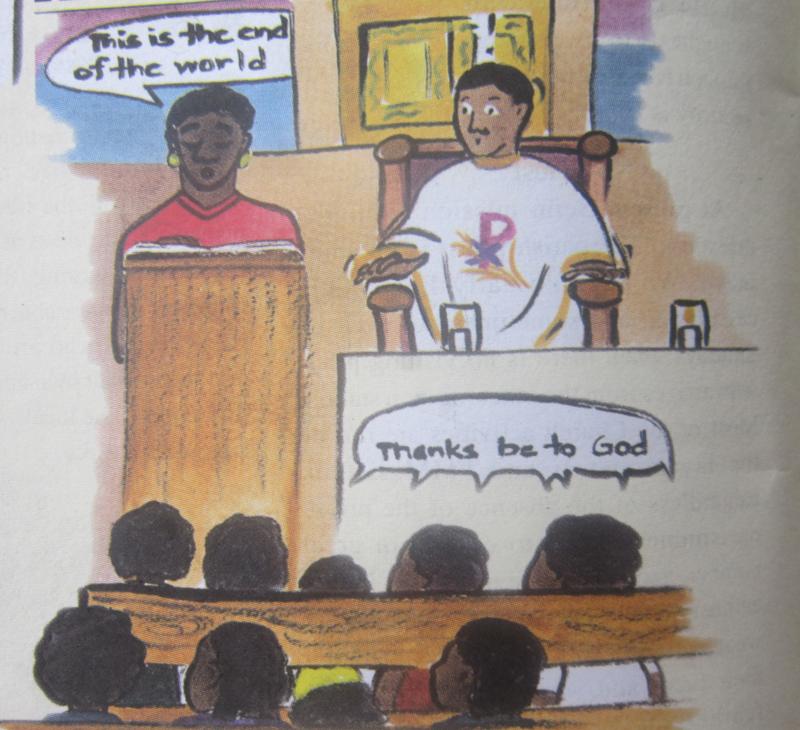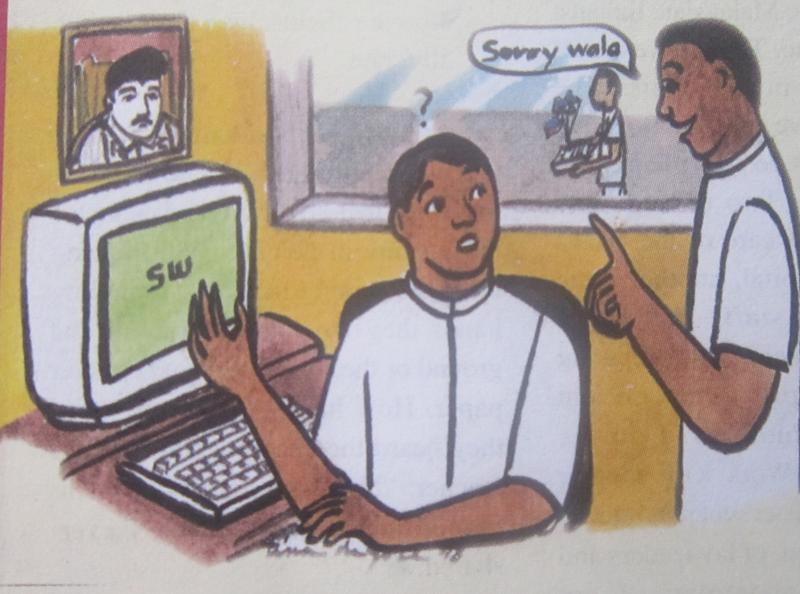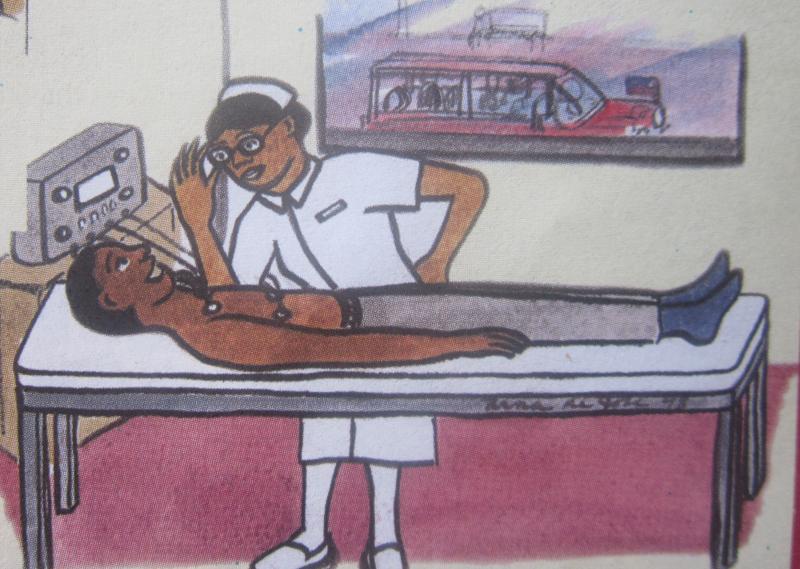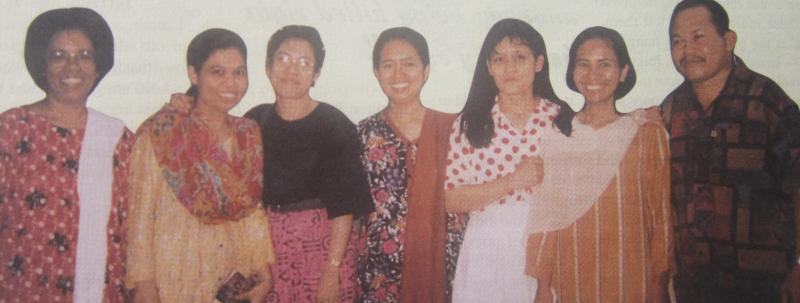July-August 1999
A Chalice For China

By James McCaslin, ssc
A bamboo curtain came down around China when Communism took over in the early ‘50s. Missionaries were imprisoned or expelled. Native Chinese priests were executed, tortured and imprisoned. A pall of sadness settled over Christians who went into hiding like in the catacombs of Rome in the time of Nero. China was struggling to stand up and declare her independence before the world and the Church-so associated in some Chinese minds with excessive colonial powers in the past – suffered in the process. We wondered in fear what was happening to the four million Catholics especially during the excesses of the cultural revolution. Then after the death of Mao Zse Tung that bamboo curtain began to part a little. Christians emerged from the catacombs and we suddenly realized with joy that they were alive and well and that the terrible pruning had born much fruit.
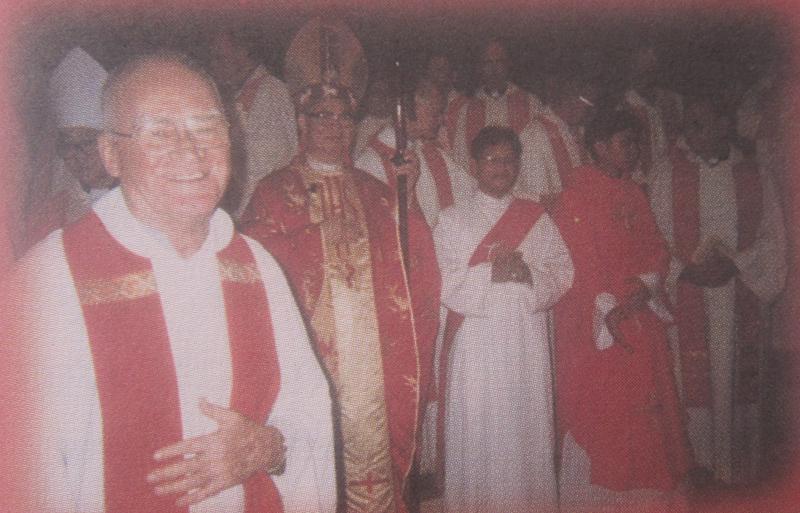 Meantime Hong Kong, once part of the great British Empire had been returned (reluctantly) to China and with it a huge Filipino population of overseas contact workers, around 150, 000. By a quirk of history these Filipinos now find themselves part of the New China. And as Fr. James McCaslin, Columban missionary in China tells us: They are bringing their faith with them.
Meantime Hong Kong, once part of the great British Empire had been returned (reluctantly) to China and with it a huge Filipino population of overseas contact workers, around 150, 000. By a quirk of history these Filipinos now find themselves part of the New China. And as Fr. James McCaslin, Columban missionary in China tells us: They are bringing their faith with them.
It was a beautiful Sunday afternoon, August 31, when Eugene Arco was ordained a deacon and Charlie Oasan a priest by the Bishop of Hong Kong, Cardinal John Baptist Wu. Members of the Congregation of the Immaculate Heart of Mary (CICM), the two Filipinos are assigned to the China Province and have studied Cantonese for two years prior to the ordination. In their words of thanks they showed the large crowd of Chinese and Filipinos how proficient they have become in Chinese.
Families and friends from the Philippines celebrated the exciting event with hundreds of their kababayan, most of whom are domestic helpers in Hong Kong. It was a very proud moment for all of us that our people are “doing missions” as priests and religious. It was also a moment of “mission” for our OCWs to demonstrate their faith in song and dance, full of joy by which they daily share their Catholic Faith. Seasoned by the Filipinos, the future Church of China will be much richer than the past, and in fact, mainly though our workers, the process had already begun.
A Stone To Touch Our Hearts
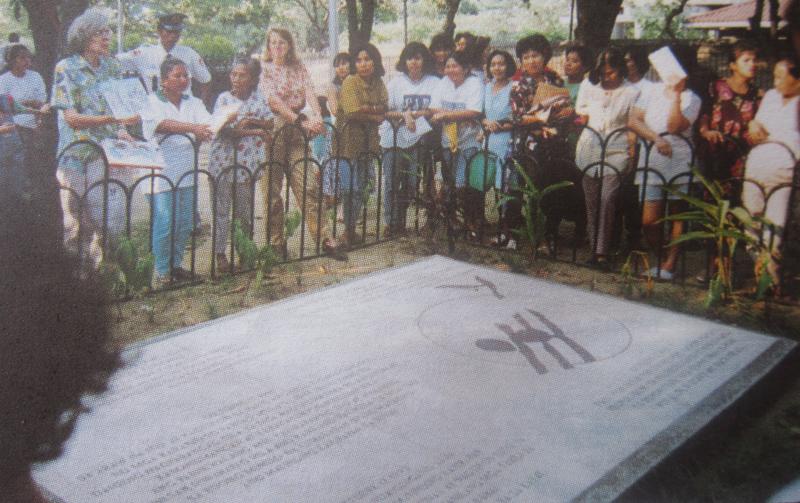
In Rizal Park, there is a strange stone placed in the ground and surrounded by railings. This stones commemorates the shocking conditions of the poorest of the poor, the most forgotten. At this stone, every 17th of the month, volunteers of the ATD Fourth World Association meet for inspiration as they struggle to walk with the outcasts of the world.
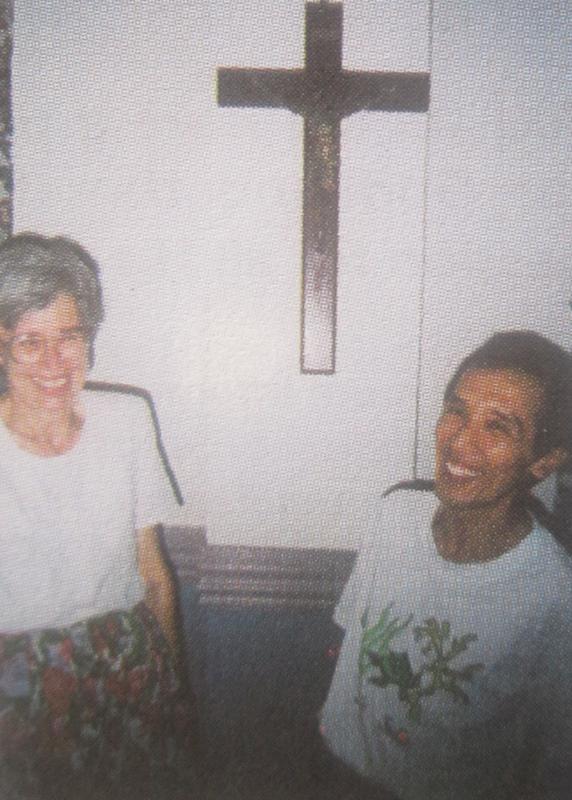 The founder of ATD Fourth World, Fr. Joseph Wresinki, wrote the accompanying poem and prayer.
The founder of ATD Fourth World, Fr. Joseph Wresinki, wrote the accompanying poem and prayer.
Panalangin ng Bayan, Pandaidigang Araw
Para sugpuin ang Matinding Kahirapan
Para sa milyong kabataan na namimilit sa hapdi ng gutom, na ni hindi na makuhang ngumiti, datapwa’t, umaasam pa ring magmahal.
Para sa milyong mga kabataan na wala nang dahilan upang maniwala, kahit na ang mabuhay, walang saysay na naghahanap sa kanilang bukas sa mundong ito.
Aming ama, dinggin mo ang aming panalangin,
Magpadala Ka ng manggagapas sa anihan.
Para sa milyong mga kalalakihan, kababaihan at mga anak na ang mga puso’y tumitibok pa rin nang buong lakas sa kumpas ng pakikibaka, ang mga isip nila’y tumanggi sa hindi makatarungang kapalarang ipinataw sa kanila, ang kanilang kagitingan ay may katumbas na walang kasing halagang karangalan.
Aming Ama, dinggin mo an gaming panalangin,
Magpadala ka ng manggagapas sa anihan.
Para sa milyong mga anak, mga kababaihan at kalalakihan na hindi ginustong mamuhi, nagnanais silang magmahal, magdasal, gumawa at magkabigkis-bigkis, upang sa gayon ay isilang ang mundo ng pagkakaisa.
Isang mundo, ating mundo, na ang lahat ng mga tao, bago sumakabilang buhay ay makapag-iwan ng pinakamabuti mula sa kanilang mga sarili.
Aming Ama, dinggin mo an gaming panalangin,
Magpadala ka ng manggagapas sa anihan
Upang ang lahat ng mga nananalangin
Sa pagiging kapiling nila ang Diyos ay makatagpo ng katugunan. At makatanggap sa Kaniya ng lakas upang alisin ang karalitaan sa sangkatauhan, ang sangkatauhan sa nilikhang kawangis Niya.
Aming Ama, dinggin mo an gaming panalangin,
Magpadala ka ng manggagapas sa anihan
--Fr. Joseph Wrensinski, 17 Oktubre 1987
Angola Diary
By Fr. Efren de Guzman, svd
Long ago, in the time of Noah, it is said that the Lord placed the rainbow in the sky as a promise of peace. As we go to the press war has flared up again in Angola as Fr. Efren feared. We ask our readers to pray that the rainbow of peace will return again to Angola. Everything else has failed. Prayer is all we have left and prayers are always answered.
July 3 Landmines
This month our mission project’s timetable is not so hectic, thus I have the opportunity to sit and write to you. I drove to Mabubas (110kms. from the capital) and we had a series of prayer meetings in preparation for the Bible months.
I would like to share with you some of our experiences there which inspired us a lot. Hope in the midst of hopefulness seems to me an impossibility, but a mother who shared in our prayer meeting asked: “Why did this happen to me? She and other mothers have amputee children, caused by landmines. There was a long silence. Then a grandmother catechist Mbeka said: “So that you will learn the true meaning of love.” Another long silence.
July 4 What is love?
Continuation of last night’s reflection:
Pai Simiao, an elder of the community of Zala, said that those who deserve love least need I most. And Gabriel Gombo, one of our catechists, shared this: “Let us never forget that the true meaning of love is best learned when it is difficult to love.”
fanpop.com
July 9 More on Landmines; Diana
In our evening prayers, we remembered and included the late Princess Diana, one of our benefactors. In one of the Vicariate Meetings in Caxito which was presided over by Bishop Damiao of Luanda, I was nominated to represent Southern Africa in the International Conference for Migrants and Refugees and the Eradication of landmines. It will be held in Capetown, South Africa and I will also have the opportunity to visit our country, specifically Davao City. In this conference, I will speak about the situation of the refugees in Angola and Southern Africa. We will discuss also the problem of landmines and their effects of these countries.
July 12 Prayer Indeed is Powerful
In this evening I was called to anoint a dying child of one of the displaced people in our parish in Kifangondo. We noticed that the child seemed not to be breathing anymore. Catechist Lao told me: “She dead!” the widow and her relatives began to cry aloud and dance in despair. I suggested we pray and I explained that only God can heal. We prayed together, anointed the girl and then I left. The next day, early in the morning they were dancing with joy (an African way of thanksgiving) telling us that the child had recuperated from her illness. We only pray and it’s God who heals.
July 14 Peace Talks
We were hoping that the recent Peace talks (held in Zambia, between the two warring parties from Angola, MPLA and UNITA) would be the beginning of the lasting peace for Angola. But it seems that things are not going in that direction. The radio and TV are saying that the UNITA is not complying the agreement of the Peace Treaty, and that the Mobuto army is helping the UNITA in the North. The UNITA is also saying that the Government is using funds to buy over the loyalty of some UNITA leaders.
The people here are really tired of war so much so that any threat to go back to the wartime situation makes the people disheartened. Because of this, the catechists, mothers and elders invited me to their prayer vigil for peace. The whole night of prayers, rosary and singing were attended by around 100 parishioners. Most of all them had lost sons and husbands in the war. For them war is a total evil.
August 3
The Bishops f Angola sent out a pastoral letter condemning the controlled media for agitating fro a new war. They emphasized in their pastoral letter that 36 years of war have proved that military solutions are not the real answer to the problems of Angola. The true solutions of it all should only come through sincere dialogue and openness.
August 28
The international community specifically the US, EU (European Union) and the United Nations really hopes that the peace would succeed in Angola. They have given the ultimatum (for three weeks) to UNITA to adhere faithfully to the agreement of the Peace Treaty in Lusaka.
September 3
We were awakened by the sudden arrival of Fr. Raymund Festin, one of the three Filipino missionaries working here in Angola. He is assigned up North in the remotest and one of the dangerous SVD mission stations in the whole of Angola. He brought to the hospital a very sick Polish confrere who is suffering from acute malaria. For seven hours, he covered the distance of 450 kilometers by car to Luanda, (without brakes!) negotiating the rugged road where the possibility of getting ambushed or blown up by land mines is very real. He arrived safe and sound but very tired. He wanted to go back in the morning to his parish in the mountain, but I calmed him down, pointing out that he had to rest for a day and I had to call the mechanics to fix the brakes of his aging Land Rover.
I want to end this letter with special blessings for you and your loved ones: May you find peace for your heart in a world you do not always understand. May the suffering you have known, and the pain and conflict you have experienced give you strength to walk through life. May you see your future as one filled with promise, as you commit yourself to the love of God, May you always feel loved by God. For with this LOVE you can always forgive and begin again.
Bow & Arrow To Pen & Ink

By Sr. Angela Jamola, fmm
Landing at Port Moresby airport, seven months ago, I thought I was in Awang airport in Cotabato City, my home province. The scenery looked familiar- the majestic coconuts, nipa palm trees, beautiful clear waving seashores which greeted me joyfully. The view changed as i bounded towards our mission station in Seim. It was just breathtaking, with the winding brown Sepik river, mountain ranges and thick rainforest.
Newcomer
It is a standard-operating-procedure in our Franciscan Missionaries of Mary (FMM) region here in Papua New Guinea that a newcomer has to visit and observe the community life and apostolate in three different mission stations within the two Dioceses. Seim belongs to the Diocese of Aitape under the Franciscan Friars (OFM). Within this period of orientation I also learned the Pidgin language and the culture of the people. After three months I finally settled down in Seim which is right in the bush.
Greatest Security
Life in the bush depends so much on nature. Brother Sun supplies us with light. When rain comes, Sister Water assists us in our household needs. Sometimes we feel insecure when Sister Rain fails to come because our water tank runs dry. Another insecurity is at night: How to protect ourselves from break –in. the parishioners are very kind to protect us at night. They volunteer themselves as security guards. They patrol around our compound at night with their bows and arrows. All of them in the village are sharp shooter hunters not farmers. We put our trust in God’s loving care and protection. After all He is the one who brought us to this strange mission land, so our greatest security is Him!
No Priest
At present Seim mission station is priestless. The parish priest is on study leave. We have no daily Eucharistic celebration and sometimes not even on Sundays when there is no visiting priest who arrives from the other mission station. Most of the Church activities are run by the lay ministers and FMM sisters. Regardless of the absence of the priest, parishioners come to church in great number, and participate in Sunday liturgy enthusiastically. On big feasts, they usually wear native decorations or leaves, paint their faces and wear Birds-of-Paradise feathers as headdresses. They have ‘singing’ dance liturgy with the beating of the ‘Kundu’ tamtam and clapping of hands.
Different Races, One Goal
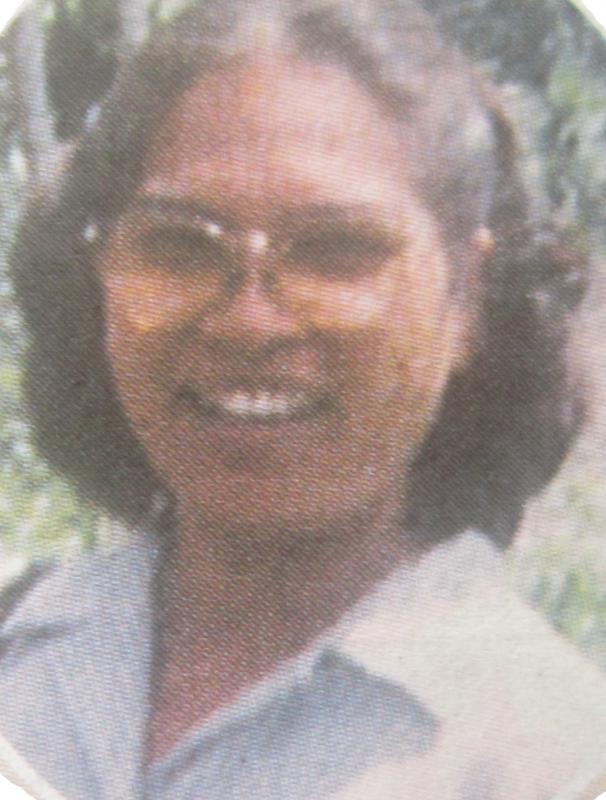 Our FMM community in Seim is composed of seven sisters with four nationalities: Malaysian, Indians, Sri Lanka and Filipino. Though we are all Asians we still vary in our cultures. The FMM charism we live binds us together giving witness to the people we minister to. Two of our Sister nurses take care of the “Huas Sik” hospitals, another three sisters staff the Girls Vocational School preparing young girls to be efficient future mothers. I do the Pastoral Work with another Filipino sister where we focus on formation of lay leaders and family life apostolate. I am involved with the Literacy Program as a response to the need of the people to learn reading and writing, 85% in the area illiterate. We were able to train 20 volunteer Para-teachers who are now actively teaching in their won villages in ‘tokples’, the local language. Thanks to the Education Forum in Cubao where I learned the methods two years ago. My only feeling of frustration is that I can’t still fully communicate with the people my compassion and joy to be with them in their struggle to liberate themselves from being illiterate.
Our FMM community in Seim is composed of seven sisters with four nationalities: Malaysian, Indians, Sri Lanka and Filipino. Though we are all Asians we still vary in our cultures. The FMM charism we live binds us together giving witness to the people we minister to. Two of our Sister nurses take care of the “Huas Sik” hospitals, another three sisters staff the Girls Vocational School preparing young girls to be efficient future mothers. I do the Pastoral Work with another Filipino sister where we focus on formation of lay leaders and family life apostolate. I am involved with the Literacy Program as a response to the need of the people to learn reading and writing, 85% in the area illiterate. We were able to train 20 volunteer Para-teachers who are now actively teaching in their won villages in ‘tokples’, the local language. Thanks to the Education Forum in Cubao where I learned the methods two years ago. My only feeling of frustration is that I can’t still fully communicate with the people my compassion and joy to be with them in their struggle to liberate themselves from being illiterate.
Eager Students
I was deeply touched at how thrilled they were to hold pencils and paper for the first time in their life. With glowing eyes and shining faces and trembling hands they write to vowels on the ground or the blackboard and on their paper. How happy they were when they heard the encouragement of the teacher, “Now you can write.” This indeed is the greatest joy I ever shared.
“So they patrol around our compound at night with their bows and arrows. All of them in the village are sharp shooters.”
“With glowing eyes and shining faces and trembling hands, they write the vowels on the ground or the blackboard and on their papers.”
Dead Man Walking
By Sister Helen Prejean, csj
Sr. Helen Prejean, a nun in the United States, was asked by a death row prisoner to be his spiritual director. She said yes but never realized what anguish awaited her. Her story has appeared in the famous movie Dead Man Walking. Here she shares it with us.
I went into the women’s room because it was the only private place in the death house. I put my head against the tile wall and grabbed the crucifix around my neck and said, Oh Jesus God, Help me. Don’t let him fall apart. If he falls apart, I fall apart.” I was scared out of my mind. I had never watched anybody being killed right before my eyes.
Just a Pen Pal
I was supposed to be Patrick Sonnier’s spiritual advisers. All I had agreed to in the beginning was to be a pen pal to this man on Louisiana’s death row. Sure, I said, I could write letters. But the man was all alone. The next thing I was saying was, “Okay, sure, I’ll come to visit you.” And when I filled out the prison application from to be approved as his visitor, he suggested I should put ‘spiritual adviser’ Again I said. “Sure” I did not know that at the end, on the evening of the execution, everybody has to leave the death house, everybody but the spiritual adviser. The spiritual adviser stays to the end. The spiritual adviser witnesses the execution.
Heart for the Poor
People ask me all the time, “What are you, a nun, doing getting involved with these murderers?” I tell them, “Look at the people Jesus hung out with – lepers, prostitutes, thieves. I got involved with death –row inmates because I got involved with poor people. It took me a while to wake up to the call of the social Gospel of JesusFor years and years when I came to the passages where Jesus was identified with poor and marginal people. I did some mental editing of the Scriptures: ‘poor’ meant spiritually poor. Other members of my religious community woke up before I did and we had fierce debates on what our mission should be and finally I understood. I began to seek out the company of poor and struggling people. And on June 1, 1981, I drove a little brown truck into St. Thomas, a black, inner city housing project in New Orleans, and began to live there with four other Sisters.
Growing up as a Southern white girls right on the cusp of the upper class, I had only known black people as my servants. Now it was my turn to serve them. It did not take long to see that for poor people, especially poor black people, there was a greased track to prison and death row. So when a friend of mine from the Prison Coalition Office asked me one day if I would be a pen pal to someone on death row in Louisiana, I agreed. I knew one thing; if he was on death row in Louisiana, he was poor.
Death Row
When I began visiting Patrick Sonnier in 1982, could not have been more naïve about prisons. He told me about life in a cell measuring six feet by eight and a half on the death row tier where he and 44 other men were confined 23 out to 24 hours a day. He would say how glad he was when summer was over because there was no air in the cells. Sometimes he would wet the sheet from his bunk and put it on the cement floor to try to cool off, or he would clean out his toilet bowl and stand in it and use a small plastic container to get water from his lavatory and pour it over his body. He was on death row four years before they killed him.
Terrible Mistake
I made a bad mistake. When I found out about Patrick Sonnier’s crime – that he had killed two teenage kids, I did not go to see the victims’ families. I stayed away because I was not sure how to deal with such raw, unadultered pain. I was a coward. I only met them at Patrick’s pardon board hearing. They were there to demand Patrick’s execution. I was there to ask the board to show him mercy. It was not a good time to meet. I was powerless to assuage their grief.
It would take me a long time to learn how to help victim’s families. A long time before I would sit up at their support group meetings and hear their unspeakable stories of loss, grief, and rage. I would learn that often after a murder friends stay away because they do not know how to respond to the pain.
Racial Discrimination
In Louisiana, the hangman’s noose, then the electric chair, and now the lethal injection are almost exclusively reserved for those who kill whites. The black or Hispanic families who have loved a one murdered not only do not expect the attorney’s office to pursue the death penalty but are surprised when the case is prosecuted at all, and most of the time they are never allowed to sit on the front row in the execution chamber to watch the murderer die.
Not a Pretty Sight
Patrick had tried to protect me from watching him die. He told me he would be okay. “Electric chair’s not a pretty sight, it could scare you” he told me. But I said, “No, no, Pat, if they kill you I’ll be there. And I remembered how the women were there at the foot of Jesus’s cross, and I said to him, “You look at my face. Look at me and I will be the face of Christ for you.” I could not bear it that he would die alone. I said, “Don’t you worry, God will help me.” And there in the women’s room, just a few hours before the execution, strength was there, like a circle of light around me. If I tried to think ahead to what would happen at midnight, I came unraveled, but there in the present I could be strong. Patrick was strong also and kept asking me, “Sister Helen, are you all right?”
Last Meal
Being in that death house was one of the most bizarre experiences I have ever had because it was not like visiting somebody dying in a hospital where you can see the person getting weaker and fading. Patrick was so fully alive, talking and responding to me and writing letters to people, and eating. I would look around at the polished tile floors, all the officials following protocol, the secretary typing up forms for the witnesses to sign in a hospitals and the final act would be to save this man’s life. I felt strange and confused because everyone was so polite. They kept asking Patrick if he needed anything. The chef came by to ask him if he liked his last meal – the steak, the potato salad, the apple pie for desert.
Thousands Deaths
When the warden with the strap-down team came for him, I walked with him. God heard his prayer, “Please, God hold up my legs.” It was the last piece of dignity he could muster. He wanted to walk. I saw this dignity in him and I have seen it in the three men I have accompanied to their deaths. I wonder how I would hold up if I were walking across a floor to a room where people are waiting to kill me. The essential torture of the death penalty is not finally the physically method of death; a bullet or rope or gas or electric current or injected drugs. The torture happens when conscious human beings are condemned to death and begin to anticipate that death and die a thousand times before they die.
Killing is Wrong
I am not saying that Patrick Sonnier was a hero. I do not want to glorify him. He did the most terrible crime of all. He killed. But he was a human being and he had dignity. He, like each of us, was more than the worst thing he had done in his life. And I can say is this: he died well. In his last words he expresses his sorrow to the victims’ family but then he said to the warden and to the unseen executioner behind the plywood panel, but killing me is wrong, too.”
Death Chair
At the end I was amazed at how ordinary the last moments were. He walked to the dark oak chair and sat in it. As guards were trapping his legs and arms and trunk he found my face and told me that he loved me. his last words of life were words of love and thankfulness and I took them in like a lighting rod and I have telling his story to the world ever since.
“I was scared out of my mind. I had never watched anybody being killed right before my eyes.”
Sr. Helen Prejean lives in Metairie, Louisiana. She is the author of Dead Man Walking. Reprinted with permission from the Tablet, London, (Peace media Service)
Father Joeker

By Fr Joseph Panabang SVD
THE END OF THE WORLD
The Sunday first reading was Dan 12:1-3.
It is all about the last judgment at the end of the world. The reader who happened to be among our new recruits stumbled at the end of the reading and instead of saying, ‘This is the Word of the Lord.’ She said, “This is the end of the world.’ And the people unfazed responded, “Thanks be to God.”
SORRY WALA
Fr. Jerry Pinado, svd, in-charge of Communication Office at Christ the King Seminary in Quezon City, had a problem with his computer. ‘What is wrong with my computer? Every time I put it on, ‘SW” appears on the screen and I do not even know what it means,” he complained. Then Fr. Eduardo Guarin, svd who just came in said. ”Aha, I know it. ‘SW’ means sorry wala”’.
LASHING RAIN
Arriving in Ga-ang my home village in Kalinga province, I was appalled by the devastating effect of El Nino. Rice fields wildly, vast lands untitled, trees and grasses drying up worse than Africa, and people seemed resigned already to the imminent hunger that would soon follow. Then came the ordination in Mangali on the 4th of April. I told the other concelebrating priests to pour all our heart in prayer for the rain. In the afternoon, it rained heavily and we were lucky we reached the first village to shelter ourselves. By 5:00 pm we continued but were caught again by the heavy downpour. We only had one umbrella which I gave to the lady catechist. I joined the rest lashed to the bone by the rain. For two days almost died of flu with people muttering, “You prayed for the rain and the rain also took you,”
PRAY FOR THE RAIN
Two weeks after the first rain we prayed for in Mangali, Kalinga, El Nino came back in its worst form. Then in Dancalan, a barrio near Ga-ang, my birthplace, I urged the dispirited and skeptical people to pray hard for the rain promising that if only they really have strong faith, they can pull down the rain anytime. Again, that night, heavy rain. With these incidents of prayers obviously answered, the faith of the people grew stronger, so strong that my sister, Flower by name, unabashedly exclaimed, “If we have problems, we must let father pray because he is next to God.” Her first born son Daniel looked at me with a skeptical smile which melted the halo my sister had given me.
LAYING EGGS
In our walled shelter in Attakora village, I was doing clerical work inside because with its thatch-roof, it is cool and cozy. Every now and then a little girl would come and peep through the door intently at the corner of the shed and then she would go again. So curious I went to see what was in the corner and behold, a hen was laying eggs.
PINOY NA AFRICANO
We returning missionaries go for a check-up. At Our Lady of Lourdes Hospital in Sta. Mesa manila, the nurse was preparing me for my cardiac stress test the time presidential candidates Joe de Venecia and Erap Estrada were challenging each other on a treadmill test. Looking up at me intently after placing all the electrodes on my body, the nurse suddenly asked, “Where are you assigned Father?” “In Africa,” I said proudly. “That’s what I thought, “she said, “Kaya pala mukha kayong Africano.”
Mighty Healer, Help Me!
By Luming de Jesus-La’o
I’m a pediatrician by profession, so you could say I’ve always been a healer. But in 1990, I discovered the gift of healing – the kind that defies scientific explanation.
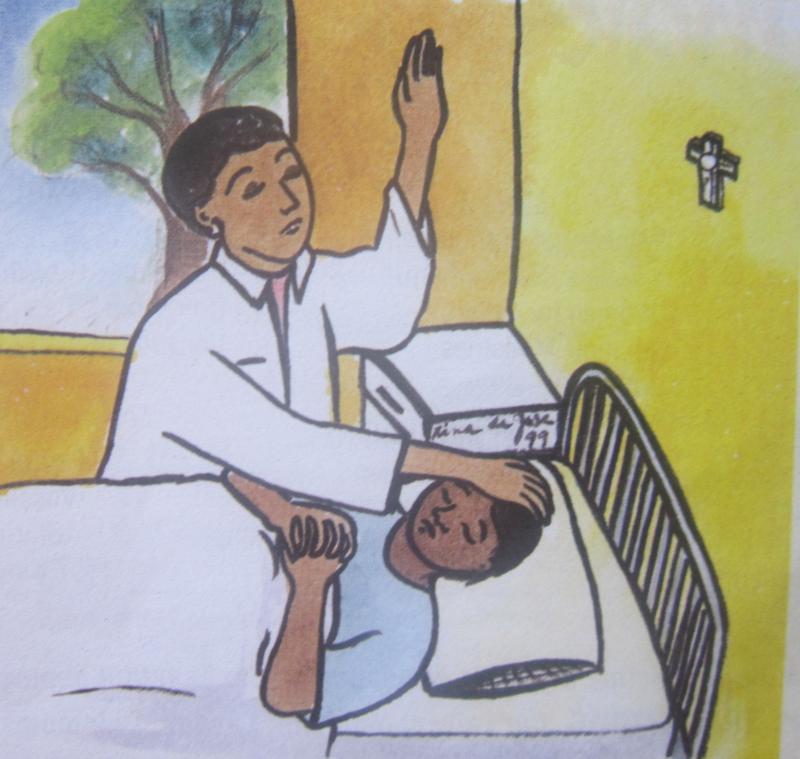
Divine Medicine
My five-year-old-grandson was running a high fever and was suffering from cold, sore throat, heat rash and diarrhea. To make matters worse, he was suffering from hyperacidity and most medications did not agree with him.
I couldn’t give him paracetamol because he would vomit. I was in a dilemma. There was no one else in the house. So I made him lie on the couch and told him, “We will pray to Jesus...say Jesus, I love you. Jesus, heal me.”
Over and over we prayed. After a few minutes, he fell asleep. By the time his mother arrived from work, the boy was already playing.
Visiting the Sick
I joined the renewal in 1982 and later I joined the Light of Jesus Community. I have been going with my community sisters to hospitals and we have been praying over patients since 1985. So I was not a stranger to healing. But since we’d always gone in a group, I never dreamed I would be singled out one day by God to be an instrument of healing.
Sick Husband
After my experience in healing my grandson, there have been several instances when Go healed people through me.
One night, when I came home from a healing seminar, I discovered that my husband might be suffering from emphysema. He kept coughing all night. So I raised my left hand and placed my right hand on his chest. Then I started to pray. “By the authority given by my Father in heaven and in the name of Jesus, my Savior and healer I command healing to take place right now. By your strife, Lord, my husband is healed.” My husband recovered that same night.
Jesus Heals
One day, I asked the lord to grant me the ability to heal seriously ill children who cannot afford medicine. God granted my petition.
A 12-year-old patient of mine contracted a viral disease and his parents were too poor to afford the necessary medicines. So I asked my patient, “Do you believe that Jesus can heal you?” The child nodded. So I prayed over him as he lay on bed. After only five minutes, he stood up and went home with his mother. He was totally cured and his parents didn’t have to buy any medicines at all.
Later, I had another patient who needed my help – a one-month-old baby with hydrocephalus. He had an enlarged head and protruding eyes. I prayed over the baby in front of the mother. When he was brought back to me a month later he was already playing. By his eighth month, his head had returned to normal size.
Praying for the Patients
Through the years, I’ve learned to balance my skills, to know when to prescribe medicine and when to pray for my patients everyday. I am very grateful to say that in all my 32 years of practice in the medical profession, I have not had a single incidence of death among my patients.
Spiritual? Healing
During a healing session, I feel a prickly sensation on my fingertips and it stops when my prayer ends. Oftentimes, I cry during these sessions and feel weak when they end. Sometimes I can even feel the patient’s pain for a while.
I am grateful to God for using me as his instrument. He not only heals physically, but spiritually as well. Should the person I am praying over die, I know that person was healed spiritually.
Mighty Healer
In the eight years that I have been in the healing ministry, pride has never set in because I know I am only an instrument of God I have complete trust in Him, for it is He who does the healing, not me. I can never thank God enough for blessing me with this wonderful gift. I pray that I would always use it wisely. And every time He wants me to bring healing to others may I always say, “Yes, Mighty Healer, use me!”
Much is Forgiven...
By Fr. Miguel A. Bernad, sj
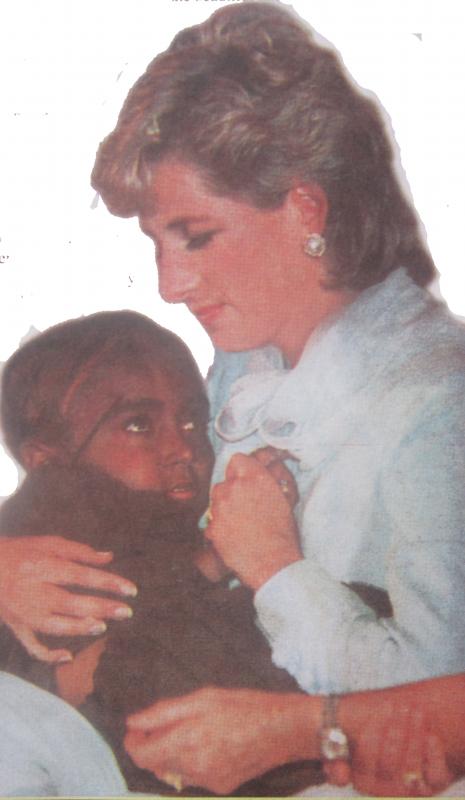
And yet, this seemingly pleasure-loving and apparently irresponsible woman was also involved with very serious concerns. Among other things, her crusade against landmines; her efforts to help find cure for AIDS; her concern for abandoned and suffering children.
The July-August issue of a mission magazine published by the Columban Fathers (Misyon, Vol. II, No. 4) has on the cover a picture of Diana which has moved me deeply. It must be the very best photograph of her. It shows her as a very different person from that projected by her other photographs.
The picture shows Diana clasping to her bosom a black child, a boy. Her right hand hugs the child to her breast. Her left hand holds up the child’s right hand. Her face is shown in profile: the eyes half closed, with a suggestion of tears, the lips in an incipient smile.
It is the picture of a mother clasping her child to her breast – even if this child is not hers and belongs to a different race. It is a picture of pure, unadulterated, unselfish, all-embracing love.
Diana did not live a saintly life, but this picture makes one think of what Our Lord said of the sinful woman who had washed his feet: “Much is forgiven her because she has loved much.”
No One Wants To Work On The Farm Anymore
By John Din
Since we arrived in Bainopolis, the parish of Padre Donaldo Hornsey situated in Bahia, we always visit the small communities or barrios. They are very alive and full of hope especially during the fiestas with songs and dances that reflect their struggle as Indios, descendants of African slaves, poor and abandoned peasants.
Calloused Hands
During the fiestas in one of the barrios called Agua-Boa-Good Water-I meet Saturnino Souza a peasant farmer. I was to take a rest under the shade of a mango tree when I saw Saturnino standing near the ‘carro de boi’ a car pulled by two cows. I noticed that he was very interested to talk to me because I was a stranger. I approached him and started the conversations with my few Portuguese words. He narrated to me how life is in the campo and in the Roca (a cultivated land). He is a farmer. Then he showed to me his two calloused hands, a sign of a hardworking man. When I held his hands I thought “these hands tell a story – a moving story.” Saturnino is analfabetizado, illiterate in the sense that he cannot read or write. But he can read the signs of nature necessary for farming and he has a way of communicating and telling a person like me how hard he works, by showing the callouses on his hands.
No Doctor
Saturnino continued: “Many ninguen quer trabalhar na roca.” (Nobody would like to work in the farm.) The road here is had and very dusty and its very far from the cities. You have to travel for many hours to reach here. There is no doctor here. Whenever we are sick we have to bring them to a nearby town but there’s no regular transportation trucks and when we arrive in the town they also do not have doctors.
No Electricity
There is no electricity here and the problem is worse when the drought is severe. Right now we are dividing the supply of water for our farms to grow rice or beans. Many families are leaving the countryside especially the youth to wander in big cities like Sao Paulo, Rio de Janeiro or Brasilia in search of jobs and to study. Many settle down in the ‘favella’ which is the squatters area. Some would like to work in the offices holding a ballpen instead of a hoe.
Life is Quiet
He paused for a while and continued “But I like to work in the farm. This is the place where I was born and I love this place. The life here is quiet and the going is slow but I know I can survive with the little piece of land I have.”
We Too Must Choose
I was deeply touched by this choice of Saturnino to stay in the camp and work on the land since we lay missionaries are also preparing to make a choice whether to work in a city like Salvador or in the rural areas. I believed the choice of Saturnino and his wife is a choice for life not only for his family but for all the Brazilians.
Prayer For Busy People
By Bo Sanchez
How to pray when you’re not a priest or nun but a regular office employee who rides the Tamara FX to work for two hours, raises three kids who need help in their homework and does the family’s laundry during weekends.
Do What Works
There is no one way of praying. Continue to search for the way of prayer that enriches you, that blesses you, that allows God to speak to you more or work in your life more. You’ll know. Because I’m a writer, I pray by writing in my journal. And that blesses me immensely. I get up from my prayer time refreshed, restored, and energized! If you were to tell me that this isn’t the proper way of praying and that I should kneel down and be quite for thirty minutes, I’d tell you to ask Him why do I feel more blessed with my improper way of praying and feel totally bored and tired with so-called ‘proper’ way. Does He like to torture me and make my time with Him totally unenjoyable?
I don’t believe there is a proper way, as I said, there are days when my prayer means I’m in front of my computer writing my journal. There are days when I get my guitar and pluck a tune. There are days when I just sit before the Blessed Sacrament and gaze at Him. There are days when I do kneel down and worship Hi, in silence! After some years, you’ll develop a set pattern, and that is great. Just ask yourself what works and blesses you more. But this principle must be balanced off by another principle essential to good relationships.
Do What’s Right
Sometimes, something doesn’t work but you know it’s the right thing to do. So do it and you’ll find out in the long-term that it will work!
Let me give you an example. While driving on the road one day, I began to pray with this urge to thank God for all the blessings in my life. I knew it was the right thing to do. So I rattled off a long list of blessings that I was thankful for: friends, work, health. I began to mention each friend, each piece of productive work, and every physical movement I could do! But you know what? At that particular time, if given a choice, my prayer wouldn’t be thanksgiving but supplication because that’s what I usually do while driving. I intercede for people. But because I did what I believed was right my heart begun to catch on, to dance with its beat. After awhile, I loved thanking the Lord. It filled my heart with so much joy with so much joy and gladness. I felt more blessed then ever. (It worked!) Today, it’s a major staple in my prayer-while-driving practice.
Be You
Because prayer is a relationship and not just a ritual, it’s important that you face God as you are. Share to Him your deepest emotions. Don’t just rattle off songs, ‘nice’ and ‘proper’ prayers without disclosing how you feel at that particular moment, and what you’re going through.
If your do just the ‘proper’ things with your husband (For example, cook for him, serve him, make love once a week,) without sharing your inner world to him as a best friend would to another best friend, your marriage is in grave danger.
Same thing with God. Your relationships with Him must be totally honest. And intimate.
Tell Him everything, at the end of prayer time, I feel a sense of connection and bondedness with God because I’ve just shared to Him either my excitement, my sorrow, my hurt, or my happiness. He knows what I’m going through, and I see Him actually sharing my excitement, my sorrow, my hurt, or my happiness with me.
Enjoy it
I believe that prayer should be fun. Really enjoyable. If it isn’t, do something about it. I don’t believe God wants you to suffer needlessly.
I’m grateful to God for giving me friends who have successful and strong marriages. They tell me how they enjoy their weekly communication time together. Sure, there are days when the husband feels lousy and would rather watch TV, or the wife would rather talk to her girlfriends about the latest shopping hit in town rather than talk to one another. But they tell me that as they remain committed to deeply sharing with each other their lives in their weekly dialogues, they end up enjoying it immensely.
There are days when their dialogues are very exciting. There are days when it’s more mellow and relaxing. There are some days when they just have to plow through it and be committed to talk even if you don’t feel like doing it. Prayer is like that. There are highs and there are lows in your prayer graph.
But I believe that your more common experience should be one of enjoying your time with God. “In your presence, there is fullness of joys, and at your right hand, there are pleasures even more.” (Psalm 16:11)
Closing Words
My relationship with God is the most important relationship in my life. It takes top priority. Because of this, I schedule short time of prayer each day and unless emergencies crop up, I usually am able to keep my time with the Lord
It doesn’t have to be long. Sometimes, I’m able to spend only fifteen minutes with Him. At other times, when time permits, I stay longer even reaching an hour.
But do you see now what I mean by relationship and not ritual?
It doesn’t bother if I have a short prayer time because throughout the day, I commune with Him. And He communes with me.
It’s not how long, what posture, what pattern and even how you perfectly keep your prayer time each day without missing one or else.
In the end, it’s about love. Not about laws about prayer.
In the end, it’s about you and God. And how intimate both of you are.
Believe me. There’s nothing quite like it in this world.
Salamat sa Kerygma. Available at most shopping centers
Tears Far From Home
By Fr.Cresencio Suarin
I am Fr. Cresencio Suarin, from the Diocese of Pagadian, Philippines. I have been a volunteer with the Columban Fathers her in Lahore, Pakistan.
Domestic Violence
Here in Pakistan, the plight of the Filipino migrant workers especially the domestic helpers who are often victims of extreme exploitation is quite discouraging. Some of them do not receive their salaries for one year or more. Others are victims of rape and other physical harassment. There are also cases of imprisonment resulting from illegal activities. Frequently they are not allowed to practice their religion. Other Filipino guest workers marry Pakistanis hoping that their social conditions would improve. Unfortunately, many of them are still victims of domestic violence despite the fact that they even became Muslims.
Good Employers
On the other hand, we have to acknowledge that there are some exceptionally good employers in Pakistan. Some of the Pinoy employees receive hefty salaries, precious jewelry, clothes, better working conditions and other benefits. There are even domestic helpers who are enjoying vacations in other countries with the family of their employers.
Organizing Filipino Communities
Recently some professional Filipino migrant workers came and and helped the domestic helpers. These professional groups are conducting medical outreach to selected poor villages once a month. Together with them we organized the Filipino community in Lahore. We were able to publish monthly newsletters. We hold weekly prayer meetings, social gatherings. We offer scholarship grants to poor but deserving high school students. We have also put up a standing fund to assist Filipino migrant workers who are in real financial stress.
Their Plight
The end of the plight of the Filipino migrants workers is still far from sight but through the support systems like these, we hope that these migrant workers will be helped along their way to the end of the long tunnel
The Angels Have Left Us
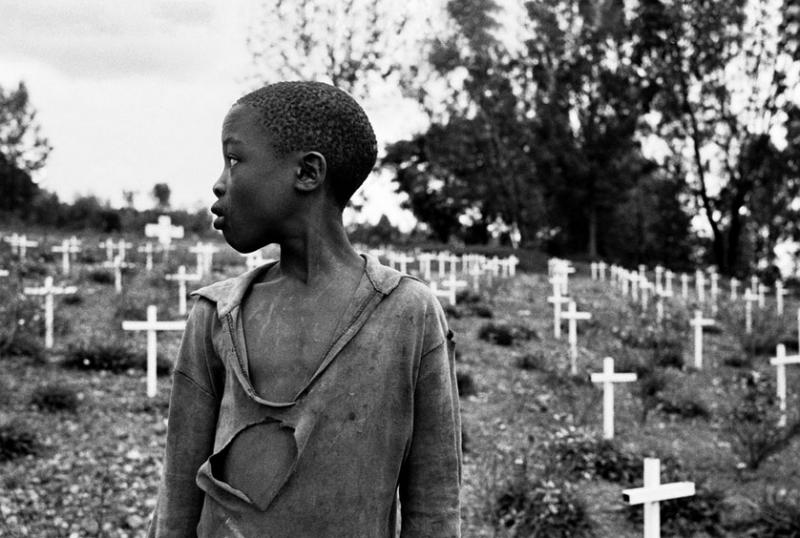
www.romainblachier.fr
The Rwanda Tragedy and the Churches
By Hugh McCullum
It’s now the five years since the mind-shattering tragedy of Rwanda when the world awoke one morning to witness on its tv screens one of the worst massacres in human history. No one, as yet knows the exact number of the dead, but the estimated figure is given as one million people. This was due to ethnic fighting between the Hutu’s and Tutsi’s. Only now, some five years later, are the real causes being clarified.
In his carefully researched book, The Angels Have Left Us, Hugh McCullum, who was a journalist in Rwanda, tries to uncover the causes and what he has discovered is not very pleasant.
*There are the arms dealers who sold weapons to all and sundry not caring how they were use. Then there is France. She comes in for lots of criticism
Already before 1990 the Rwandese military began stockpiling expensive light and heavy weapons purchased discreetly from Egypt and South Africa and paid for, equally discreetly, by the French, ever concerned to maintain their influence in franchophone Africa
*The United Nations also comes in for criticism. Some feel they would have intervened. It is said that they would have intervened if the population had been European but that Africans were dispensable.
*Then there were the churches – Protestant and Catholic – (but especially the Catholic which is the largest Church in Rwanda). They come in for severe criticism because they received favors from the government and were not prepared to criticize the very government policies which led to the Rwanda massacre. Apart from that quite a number of religious actually joined in the massacres.
Most Rwandese Christians would agree that the extremely close ties of important church leaders to the Habyarimana regime, compromised their prophetic voice and undermined completely their moral authority.
But individual devout people come in for praise. They refused to join in the massacres and they themselves were massacred.
It cannot be underlined too strongly that there were many countless acts o heroism, even among some religious leaders, once they got over the shock of the murderous attacks on their once-sacred compounds. They hid and protected many thousands of people who might have been massacred, often at the price of their own lives, and of their families.
The revelations of this book forces us missionaries to ask difficult questions:
1. Does receiving privilege and status from the Government not tie our hands when it comes to speaking out on injustice by that same government?
2. Did our catechesis contain strong enough teaching on racism and tribalism?
3. Does it now tackle this problem effectively?
4. What should we do about this in the future?
McCullun concludes: if the Church of the Future can move beyond mere survival to its basic mission of preaching justice, peace and reconciliation – there is hope. I hope someone is listening.
The book, The Angels Have Left Us, is published by the World Council of Churches, WCC Publications and is available from the World Council of Churches, 150 route de Ferney, 1211 Geneva 2, Switzerland. (No. 66 in the Risk Book Series.)
“More than two- thirds of Rwanda’s Catholic priests were either dead or in exile. At the end of 1994, only two of the nine bishops were in the country. Three had been killed, two were ill and two in exile. The figures for protestant leaders are similar.”
The Day I Meet The Lepers
By Gee-Gee Torres, editorial assistant
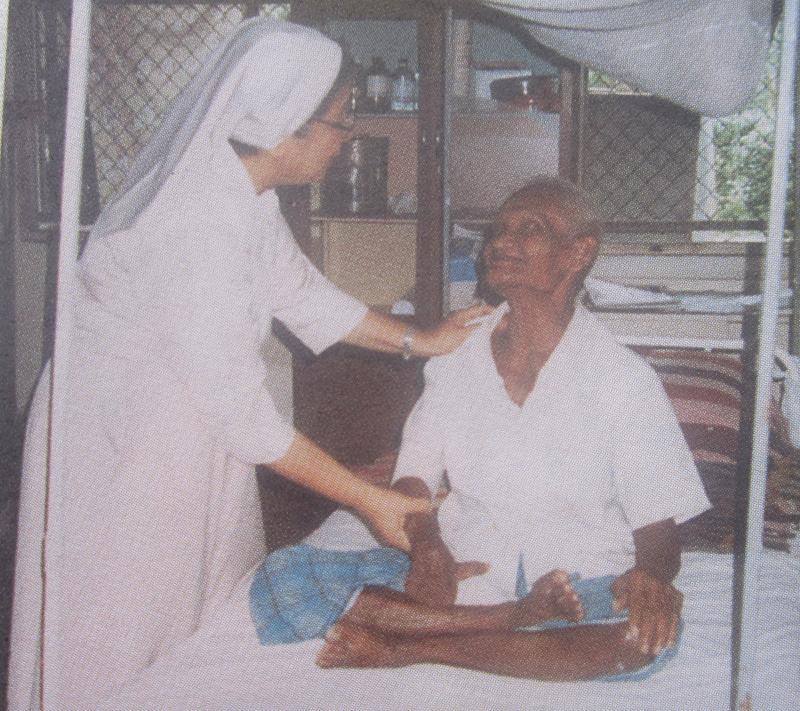
Phud Hong Leprosarium
It was a long trip to Nakon Si Thammarat province in Southern Thailand. We passed through rugged limestone mountains and vast plantations of rubber, coconut and pineapple. Along the way I focused my attention at the beautiful landscape of the countryside; I didn’t want to think of the people we were going to visit in Phud Hong Leprosarium. But no matter how hard I tried, something deep inside was telling me to accept the fact that I was going to Phud Hong Leprosarium to visit lepers. I was scared. Yes, I was afraid to see a leper face to face. I was afraid to touch them or even go near them lest I get infected. I wasn’t sure if I could handle myself well if a person with a decaying nose should extend his hand to me, I would soon discover.
The Big Day
Before I know it, we were already inside the leprosarium. We entered a village with coconut trees lined along the road. I could see concrete houses with gardens. The surrounding was clean, no trace of plastic wrappers, tin cans, cigarette butts lying on the ground. I was truly amazed. What I was seeing was far different from the gruesome conditions under which Fr. Efren de Guzman has to work in Angola. I shudder when I see them as I edit his articles.
Sr. Mater brought me first to the nursery and kindergarten schools for the children and grandchildren of leper patients. We entered one of the classrooms and I saw healthy children dressed neatly in their uniforms. Then, off we went to the patients’ ward. I was forewarned to be calm if I should see a leper with no nose or with a missing ear. I braced myself as I stepped foot inside the ward. There I met a leper for the first time in my life. Surprisingly all my fears disappeared when I saw welcoming smiles on their faces. I got excited and forgot all about the missing noses and ears.
Neglected by the Government
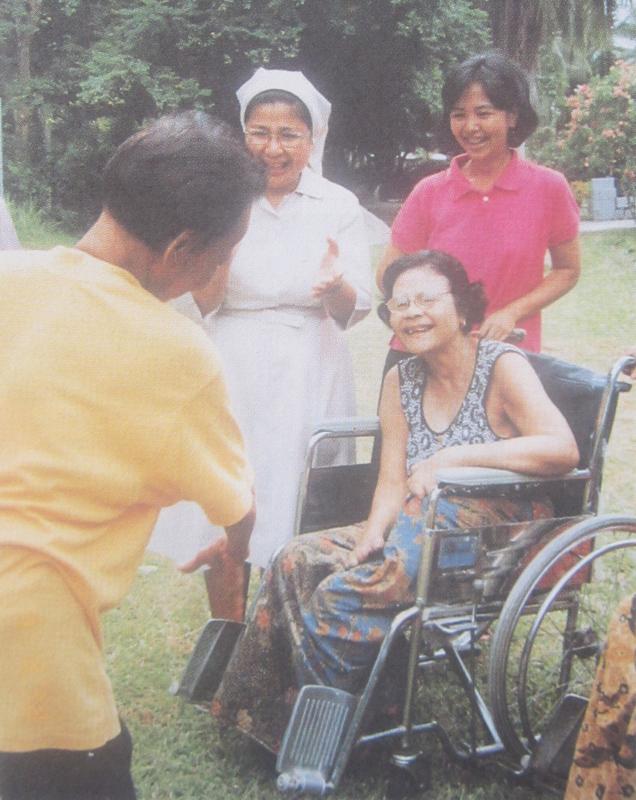
Leper Foundation
But during the mid-70s things changed. An article about the plight of Phud Hong Leper Colony was published in the Bangkok Post. It touched the heart of so many readers. Donations from various people and organizations from all over Thailand and abroad began pouring in. and in a short period of time the lives of the people in Phud Hong were never the same again.
Educational and Development Programs
A whole array of programs was introduced to the people in Phud Hong Leprosarium. But the people at first were reluctant to participate in the various developments in the various development programs. They had got used to the dole-out system which had been adopted by the first group who helped them in the mid-70s. During that time the lepers had to be well – taken care of and provided with their basic needs because they were at a helpless stage. However with perseverance and the help of many people such as Sr. Mater of the Daughters of Charity the foundation succeeded in implementing its programs. “We encourage them to become self-reliant and help them recognize themselves as persons who can do something for themselves and for others even if they are handicapped,” said Sr. Mater.
Self-reliant People
Today Phud Hong Leper Colony is a place people talk about not because of its distressing state, but because of its transformation into a community of 229 families with its own clinic, nursery and kindergarten school and a vocational training center. Families of ex-lepers are now able to support themselves. Some of their children have finished college or vocational courses. These children are now working and providing their families with their needs. Leper patients, on the other hand, are given proper medical care and are housed in a clinic equipped with basic medical facilities.
Her name is Joy
One of the patients I met in the ward is a thirteen-year-old- girl, Joy. She looked smaller that other children of her age. I was surprised to see her among the old people. I never expected to see a child infected with leprosy. I asked Sr. Mater how she got the disease. “Joy was infected with the disease because of unsanitary living conditions and poor nutrition. Her mother brought her here because she couldn’t afford to take care of Joy,” said Sr. Mater.
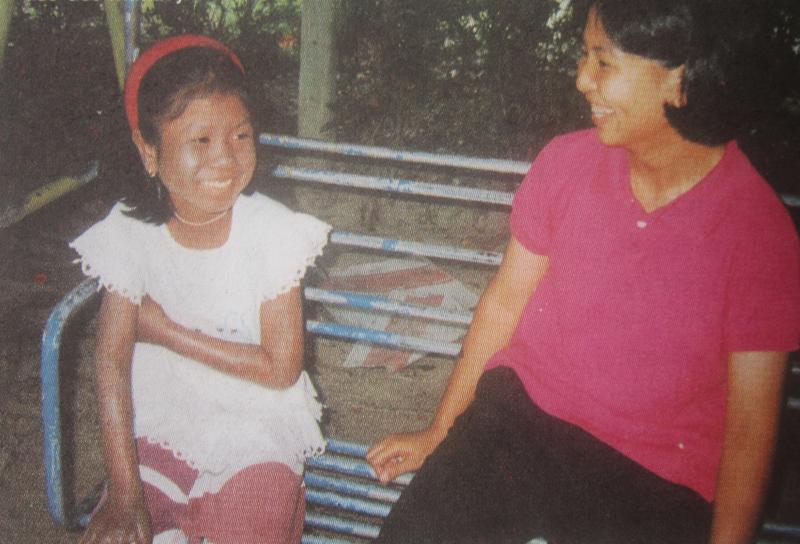
P.S. Thanks to those who care to share their lives with these special people. Leper patients are given a chance to live normal and fruitful lives.
There are now four Daughters of Charity sisters working in Phud Hong Leper Colony. Two are Filipino (Srs. Mater Leal and Naty Endriga) and two are Thai (Srs. Wat and Raty). With lay partners from the village they do their weekly duties like home visits and regular rounds to the patients in the wards.
“Leprosy is not as terrifying as people often think. It is now a curable disease and not easily acquired. With proper medical treatment and sanitary care, permanents disability can be prevented.”
The Inside Story
Msgr. Des Hartford concludes his diary written in captivity
Tuesday 4 November
I pray as best I can. Around 6 a.m. I get my first wash in 3 days from a hose downstairs. Continual conversation on the two-way radio. My release always seems to be ‘tomorrow’. My bible, breviary and rosary beads that I had requested were brought from Marawi. At 8 am. I was told to pack. The army were approaching. I was taken back to the house near the village. Feeling very low. One of my original captors brought me a cutting from the Daily Inquirer which said I would be released soon. A group of people on their way back of people on their way back to a mountain village came to look at me. One of them encouraged me to escape they seemed genuine. Their leader sat on the bed and every now and then he would spit though a tiny vent in the wall. If ever there was an international spitting contest the Maranaos would get the gold medals for accuracy. At 4:30 pm I was told to pack again. All this moving is exhausting. A 30-minutes walk to a house where there was a husband, wife and one little girl. This family is special. It is the only Christian family in the entire area. I felt relaxed. Everything was neat and simple. The little girl talked to me all the time. It seems that another rebel returnee from Lanao del Sur has brought up to 100 armed men to try to take me from the MILF. I am on the run with my guards. It is tiring and distressful because in has brought a new threat to my life. “The snares has been broken and we have escaped”. That verse of the psalm gives me a lot of hope and courage.
Wednesday 5 November
Despite the improved surroundings I did not to sleep well. I wrote a letters to governor Dimaporo and Congressman Datu Mangontara requesting them to finish the process immediately and forego political ambition. I also requested that the army do not get directly involved. My guards keep telling me that the moving around is for my safety and to avoid a clash with the armed group of rebel returnees. During the morning one of my guards suggested that he was open to a bribe if he and I were to try and escape together. About 9:30 a.m. we were told to move again. It seems the ground from Lanao del Sur is really out to get their hands on me and even take me to Lanao. We walked for 40 minutes through cornfields and ravines. The sun was hot but we had good covers under the banana tree the guards are apprehensive. Nobody knows what will happen if the other group catches up on us. I find it very distressing. I eat as many bananas as I can. At around 6:30 p.m. we were on the move again. My guards carry very heavy loads. They always bring my mosquito net and a cover that is used on the ground if the weather is dry and overhead if it is raining. We cross coconut groves and cornfields. At one point we were ordered to lie on the ground. A horse and rider galloped past into the night. They hear things at least 10 seconds before I do. After about 4 hours we came to another cornfield with 6 feet high stalks. My guards insisted that I take off my shoes so as not to leave marks. By now everyone was exhausted. They put up my net. The ground was damp and there was dew on the corn.
Thursday 6 November
I slept for about 3 hours and woke shivering. I thought I had a fever but luckily it was just the cold. At daybreak we had coffee made on a little gas stove. I read morning prayer before we left at 6:30 a.m. We hopped from stone to stone along the river bed for about a kilometers. I was wearing a black jacket with a balaklava. We only met one man. He was told he would have his throat slit if he said anything. We left the river and climbed for more than an hour. My energy was completely gone. We stopped once and I found it almost impossible to start again. The mosquitoes were bad. A clatter of wild monkeys passed by jumping from tree to tree. Eventually we came near an area where there were houses. We had stay in the wood. I tried to pray. I felt my prayer was heard when I said I did not want o die now. The scripture text I opened was the raising of Lazarus, “Loose his bonds and let him go free.” The anxiety of the guards makes me anxious. After dark we were on the move again under a bright moon there was an alert that an armed group were approaching from the opposite direction. One of the guards caught me by the hand and we begun to run in a semi circle around the hill. We ran and slipped, slipped and ran. I seemed to have gone beyond fear at this stage. It was almost exciting as if it was all just a dream. At last the ‘all clear’. I insisted I wanted to spend a night in a house. They insisted that I go into a small tarpaulin ‘tent’ they had erected in the long grass. I began for the first time to resent very much the way my guards were treating me even though they were saving me from being taken over by the other group who wanted to kidnap me for ransom. I ate some bread and drank the last of the boiled water. One of the guards is snoring near the tent.
Friday 7 November
During the night the mosquito net kept falling down. The mosquitoes were buzzing outside. I tries to pray as dawn was breaking. I resent this inhuman confinement.
Morning Prayer has the words of St. Paul. “When I am weak then I am strong.” My guards tell me it is almost over.
At about 9 a.m. I was allowed to come out and sit upright. I was taken back to a house in the village. On the way the guards had got some coconut from a tree which we ate. In the house I was given a meal a meal and water to wash. People fill me in on what has happened. According to them as many as 500 armed men from Lanao del Sur are looking for us. It is amazing that we avoided them for three days. The guards can survive for a long time in the jungle.
Around 2:30 p.m. great commotion again. I was dressed in the local malong and they gave me a large black veil worn by women and told to cover my head. We ran towards the forest again. Soldiers of the Philippine army had been sighted in the distance. The guards told me that negotiations were in their final phase but, if they failed I was to be handed back to my original captors. I prayed and told the Lord “I cannot take anymore”. The guards also told me that the group we narrowly escaped last night was from the MILF. They were trying to release me. It is ironic that I was unknowingly fleeing from a group that was trying to rescue me.
At about 6:30 p.m. just after dark a local MILF leader came and told us it is all over. Agreements have been finalized. For the last time I packed my things. The guards asked for forgiveness if they had mistreated me in any way. I felt no animosity against them. They had put their lives on the line in order to protect me. I felt a bit short changed by the fact that although it was over I still had to walk for about two hours under guard. They were afraid of unfriendly snipers. We went back to the MILF camp. There the one who had given me the notebook so that I could keep these notes talked about Islam and Christianity. Armed guards returned to say that the coast was clear and we walked on again in the darkness to what is considered the boundary of territories between the Philippine army and the MILF. The MILF commander handed me over to an official of the AFP. The rebel commanders quickly disappeared into the darkness but some of their ordinary foot soldiers joined the bandwagon to see things to their conclusion. Some of them rode motorbikes, others jumped on the vehicle of the AFP.
Msgr. Hartford is now back in his prelature in Mindanao.
